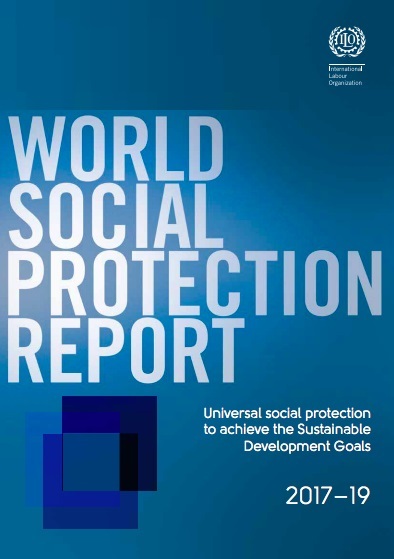Over 4 billion receive ineffective social protection: ILO
By Kim Da-solPublished : Dec. 5, 2017 - 16:42
Only 45 percent of the global population are effectively covered by at least one social protection benefit, while the remaining 55 percent or as many as 4 billion people are left unprotected, according to a report released by the International Labor Organization.
ILO’s World Social Protection Report 2017-19 said that the lack of social protection left people vulnerable to ill-health, poverty, inequality and social exclusion throughout their lifecycle.
ILO’s World Social Protection Report 2017-19 said that the lack of social protection left people vulnerable to ill-health, poverty, inequality and social exclusion throughout their lifecycle.

ILO estimates showed that only 29 percent of the global population are covered by comprehensive social security systems that include the full range of benefits, from child and family benefits to old-age pensions.
However, the large majority of 71 percent, or 5.2 billion people, are not or are only partially protected, the report said.
Social protection includes benefits for children and families, maternity, unemployment, employment injury, sickness, old age, disability, survivors, as well as health protection, and it plays a key role in achieving sustainable development, according to ILO.
“Denying this human right to 4 billion people worldwide is a significant obstacle to economic and social development,” ILO Director-General Guy Ryder said in the report.
The report stressed while many countries have come a long way in strengthening their social protection systems, major efforts are still necessary to ensure that the right to social protection becomes a reality for all.
It also underlined the need to tackle the gap in pension coverage in the era of an unprecedented and rapidly ageing society.
“Where OECD countries took 50 to 100 years to see a transition from young to old societies, Asian countries are taking just 20 to 25 years. And yet, nearly half the elderly in the region still do not benefit from a pension, a proportion that is only higher in Africa,” said ILO’s social protection expert Nuno Cunha.
On average, Asian countries like Thailand spend slightly over 1 percent of its gross domestic product on pensions even though 6 percent of their population are people aged 65 or over. In contrast, Latin America, where 7.7 percent of the population are aged 65 or more, spend nearly 7 percent of their GDP on pensions.
In September, the Korean Ministry of Interior and Safety announced that the country had officially entered into an aged society as those aged 65 or older made up 14 percent of the population. In 2050, those aged 65 or more will account for 37.4 percent of the population with a life expectancy of 89.3 years old, according to a United Nations report.
Currently, half of Korea‘s population aged 65 and over lives in relative poverty, nearly four times higher than the Organization for Economic Cooperation and Development average of 13 percent. There are three different types of pension incomes that those aged 65 or older can receive: social welfare, public pension, and private pension.
“Korea is a late starter in terms of pension systems and the number of people benefiting from an adequate contributory pension is still low,” Cunha told The Korea Herald during an ILO meeting held in Bangkok in November.
“Korea should consider adjusting the current contribution rate of 9 percent to find adequacy of pension benefits,” he said, adding that Portugal, where he is from, collects almost 27 percent of the contribution rate for the pension program.
South Korea adopted the state pension program in 1988 to guarantee income for the elderly after retirement, and to provide coverage for disabilities and surviving family members. As of June, it had 21.67 million subscribers with 4.28 million people being eligible for payments.
ILO has been publishing reports to highlight that universal social protection contributes to eradicating poverty, reducing inequality, promoting economic growth and social justice, as well as achieving the Sustainable Development Goals.
By Kim Da-sol (ddd@heraldcorp.com)







![[Graphic News] More Koreans say they plan long-distance trips this year](http://res.heraldm.com/phpwas/restmb_idxmake.php?idx=644&simg=/content/image/2024/04/17/20240417050828_0.gif&u=)
![[KH Explains] Hyundai's full hybrid edge to pay off amid slow transition to pure EVs](http://res.heraldm.com/phpwas/restmb_idxmake.php?idx=644&simg=/content/image/2024/04/18/20240418050645_0.jpg&u=20240419100350)






![[From the Scene] Monks, Buddhists hail return of remains of Buddhas](http://res.heraldm.com/phpwas/restmb_idxmake.php?idx=652&simg=/content/image/2024/04/19/20240419050617_0.jpg&u=20240419175937)

![[KH Explains] Hyundai's full hybrid edge to pay off amid slow transition to pure EVs](http://res.heraldm.com/phpwas/restmb_idxmake.php?idx=652&simg=/content/image/2024/04/18/20240418050645_0.jpg&u=20240419100350)

![[Today’s K-pop] Illit drops debut single remix](http://res.heraldm.com/phpwas/restmb_idxmake.php?idx=642&simg=/content/image/2024/04/19/20240419050612_0.jpg&u=)